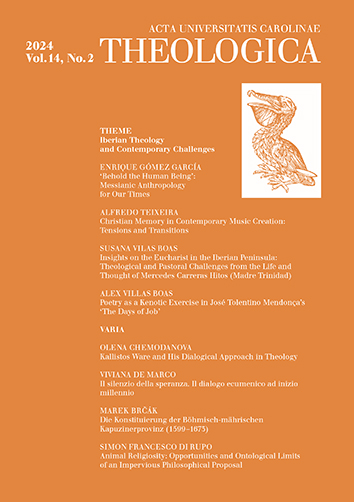AUC Theologica is a peer-reviewed journal for theology published twice a year. As we publish original papers in English, German, French, and Italian, our mission is to serve as a platform both for Czech researchers, who can present their research results in these languages, and for international contributors, who are invited to enter the academic theological discussion in the heart of Europe.
The journal focuses on a wide range of theological disciplines, such as systematic theology, biblical studies, patristic studies, pastoral and spiritual theology, religious education, church history, etc. Within these fields, the journal seeks to reflect the current theological questions and problems, which often requires interdisciplinary approaches. Supporting the intersection of various theological disciplines, we thus also welcome theological papers touching other academic fields including philosophy, sociology, literary studies, and science.
Each issue consists of two sections. The thematic section presents papers of the same focus. The section called ‘Varia’ invites papers dealing with various theological themes from the perspective of all Christian traditions. Our current and past issues are approachable for free on this website in the form of Open Access.
AUC THEOLOGICA, Vol 7 No 2 (2017), 75–86
The Category of Testimony as an Axis of Fundamental Ecclesiology: The Credibility of the Church in the Work of Salvador Pié-Ninot
David Bouma
DOI: https://doi.org/10.14712/23363398.2017.20
published online: 18. 02. 2018
abstract
The article presents the fundamental ecclesiology of the contemporary Catholic theologian Salvador Pie-Ninot (*1941). The text shows the way in which he solves the question of the credibility of the Church and the attitudes of private Christianity with its negative attitude towards the Church (believing without belonging). Pie-Ninot underlines that the credibility of the Church is dependent on revelation and that the character of faith is ecclesial. He interconnects the last two councils: the concept of the Church, whose divine character is approachable by man (via empirica, the way of experience) as it is taught by the First Vatican Council, with the ecclesial stances of the Second Vatican Council, which reduces the emphasis on the attributes of the Church in favour of revelation, the person of Jesus Christ and a personal relationship to him. Pie-Ninot then offers the way of testimony, which includes the outer (for example, apostolic tradition) and inner form of churchly reality (personal life according to the demands of the Gospel) and perceives the Church as a privileged space of God’s revelation and salvation.
keywords: Catholic Theology; Salvador Pié-Ninot (1941); Fundamental Theology; Ecclesiology; New Via Empirica

The Category of Testimony as an Axis of Fundamental Ecclesiology: The Credibility of the Church in the Work of Salvador Pié-Ninot is licensed under a Creative Commons Attribution 4.0 International License.
148 x 210 mm
periodicity: 2 x per year
print price: 100 czk
ISSN: 1804-5588
E-ISSN: 2336-3398
